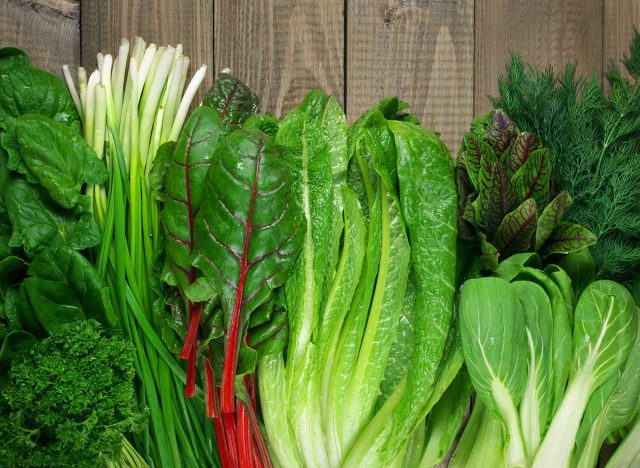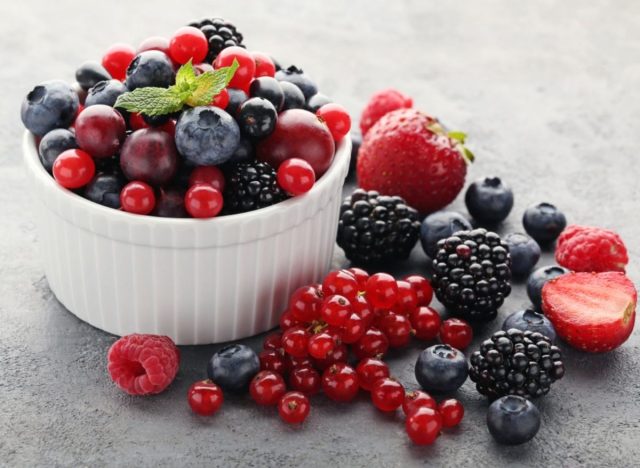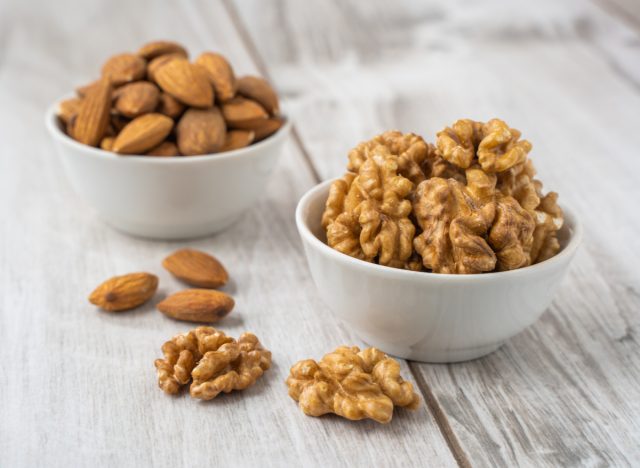When it comes to eating the right diet for your brain health, experts are still in the process of figuring out exactly what foods do the most good. Scientists have already narrowed down some of the worst contenders. A study published in Current Opinion in Clinical Nutrition and Metabolic Care linked diets filled with sugar to Alzheimer's disease, while eating patterns loaded with trans fats may also lead to Alzheimer's disease, according to a study retrieved from Neurobiology of Aging. While the average person generally knows what to stay away from, few may know that the best foods for your brain health might be right in front of you.
A variety of eating patterns, like the Mediterranean diet or the MIND diet now have the potential to not only keep you eating a balanced nutritional intake, but also help keep your brain sharp as you age and stave off dementia. The specific foods that make up the meal regimens come loaded with particular nutrients that science has now started to embrace as essential components that can naturally ward off brain degradation. By adjusting your eating habits to accommodate a few certain foods, you can potentially keep your mind fit and avoid encountering dementia in your later years.
If you want to pull out all the stops and embrace an eating plan that can give you the best brain health, try out The #1 Best Diet for Dementia for maximum results.

Leafy greens provide a huge amount of nutrients for anyone looking to supercharge their diet. It now looks like this type of produce has the potential to protect your brain from dementia.
According to a study published in The American Journal of Clinical Nutrition, scientists scanned the brains of study participants that followed a plant-heavy version of the Mediterranean diet and a regular version of the same eating plan. The researchers found that those who ate a diet rich in greens, among a few other key foods, showed the fewest signs of mental degradation when compared to the other participants.
If you want to tap into this produce and get the most bang for your buck, make sure to include The Best & Worst Greens to Eat—Ranked by Nutritional Benefits into your own diet.

You have heard a ton of arguments for eating more fish, but now, it looks like omega-3 fatty acids have the potential to keep your brain in top shape. A 2009 study retrieved from PLEFA correlated reduced levels of this key nutrient with mental decline and a higher risk of developing dementia or Alzheimer's disease.
A separate study published in the Archives of Neurology independently came to the same conclusion after studying a large community group and finding that those who eat more omega-3 fatty acids end up protecting their brain.
Don't think you can take the easy way out and just take supplements either. Another article found in JAMA revealed that omega-3 supplements could not compete with the nutrients absorbed when you eat fish. Don't skimp on this key nutrient next time you hit up your local seafood restaurant. Opt to order one of the 26 Best Omega-3 Foods to Fight Inflammation and Support Heart Health.

You may have heard a ton of arguments supporting the use of coconut oil, walnut oil, and other alternative fats. While these items have their place in the kitchen, you can't go wrong with regular olive oil, especially if you want to keep your brain sharp as you age.
A 2022 study from the Journal of the American College of Cardiology traced 92,000 participants' diets and found that those who ate high amounts of olive oil had a 29% lower risk of dying due to dementia or other neurological diseases when compared to those who didn't usually eat olive oil in their meals. If you ever need an excuse to make your own salad dressing or top off your favorite meal with this oil, just remember that your brain will thank you.

Flavonoids come in all shapes, sizes, and colors, but experts can agree that this nutrient helps stave off brain degeneration. If you want to naturally get more of this compound in your life, you can't go wrong by loading up on colorful fruits and vegetables. A 2021 study found in Neurology followed 77,000 participants over 20 years to study their diets and found that those who ate high concentrations of flavonoids had better neurological health as they age.
Colorful fruits and vegetables naturally contain large amounts of this nutrient, but one particular type of fruit might rank better than many other foods when it comes to protecting you against dementia.

Science is slowly uncovering the truth about berries—they can stave off cognitive decline better than many other foods. Research conducted in association with Rutgers revealed that berries come packed with antioxidants and flavonoids, and it looks like this type of fruit not only slows down mental aging, it might hold the key to fighting dementia.
The key lies in berries' ability to prevent oxidation and could even negate many of the negatives of a high-fat diet. A separate 2012 study retrieved from the Annals of Neurology also came to the same conclusion—the more berries a person ate, the slower their mental state declined.
Berries do more than just protect your brain. They also rank as The #1 Best Fruit for Your Heart and anyone looking to eat healthy should aim to grab a handful of this fruit next time a craving strikes.

Nuts provide a wealth of nutrition, but it looks like this food now presents one more major benefit. According to a study published in Nutrients, walnuts have a strong link to warding off dementia, depression, and other neurological conditions due to the fact that they prevent inflammation and oxidation.
If you don't like walnuts, you might need to learn to love them. Another study from Advances in Nutrition revealed that mixed nuts don't do the trick, and the only positive correlations between the prevention of cognitive decline and nuts occurred when participants ate walnuts. Another piece of research from The Journal of Nutrition, Health, and Aging found that nuts, in general, have the potential to help older women stave off mental decline, but just to be safe, make sure you grab a few extra walnuts if you do decide to eat a mixture of this food.

If you want to supercharge your diet and potentially prevent dementia in your later years, digging into more legumes can't hurt. A study found in the Journal of Translational Medicine traced 200 participants in Italy over the age of 65 and found that those who ate higher amounts of beans and pulses ended up scoring better on cognitive health tests.
If that can't convince you to eat more beans and lentils on a weekly basis, the Secret Side Effects of Eating Beans might just help change your mind and influence the way you enjoy this key food that can help prevent dementia.
The 7 Eating Habits That May Actually Work to Fight Dementia, Says Science — Eat This Not That - Eat This, Not That
Read More


No comments:
Post a Comment